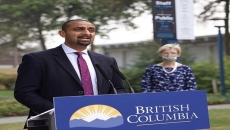A senior female officer of the Canadian Armed Forces is quitting the military, saying she is "sickened" by investigations into alleged misconduct involving senior leaders — and “disgusted” it took so long for the top brass to come under the microscope.
Lt.-Col. Eleanor Taylor also states in her sharply worded resignation letter, obtained by The Canadian Press, that she believes the failure of senior leaders to set an example has "poisoned" efforts to stamp sexual misconduct from the ranks in recent years.
“While I remain fiercely proud of parts of our organization, on the issue of addressing harmful sexual behaviour, we have lost all credibility,” writes Taylor, who commanded an infantry company in Afghanistan and served with the military’s special forces.
“For me, the breach of trust has been too much, and my release is the best tool at my disposal to highlight the depth of my disappointment.”
Taylor’s resignation after more than 25 years in uniform comes amid emerging allegations of misconduct involving senior members of the Armed Forces, including the two most recent chiefs of the defence staff, Gen. Jonathan Vance and Admiral Art McDonald.
It also coincides with mounting questions about the military’s ongoing inability to tackle an issue that has emerged and re-emerged numerous times over more than two decades.
In an unsigned statement Wednesday, the Department of National Defence described Taylor as "an outstanding officer, respected for her bravery, skills, intellect and compassion."
"This loss highlights the importance of tackling this issue," it added. "We have reached out to Lt.-Col. Taylor to learn from her as part of our ongoing efforts to address broader cultural issues so that the CAF may emerge as a stronger, better, and more effective force."
Taylor writes in her resignation letter that she was “encouraged by the resolve our leadership showed” when Vance launched what is known as Operation Honour, the all-out effort to eliminate military sexual misconduct, upon taking command of the Armed Forces in July 2015.
Vance is now alleged to have had an ongoing relationship with a subordinate that began more than a decade ago and continued after he became chief of the defence staff. He is also accused of having sent a lewd email to a junior soldier in 2012.
The allegations were reported in early February by Global News, which says Vance has denied any wrongdoing. The Canadian Press has not independently verified the allegations, and Vance has declined to respond to requests for comment.
McDonald, who took over as defence chief from Vance in January, has temporarily stepped aside while military police investigate an allegation of misconduct. It has not been detailed publicly.
Taylor, who currently serves in a command role with a reserve unit in Halifax, does not mention any specific senior officers in her resignation letter, but writes of Operation Honour: “Sadly, the failure of senior leadership to set the example on the operation has poisoned it.
“In my assessment,” she continues, “the damage to progress on this issue is grievous and the question around whether the damage outweighs the gains remains open. My recommendation is to drop immediately the name Operation Honour — it is now harmful.”
She also says that she is “sickened by ongoing investigations of sexual misconduct among our key leaders. Unfortunately, I am not surprised. … I am disgusted that it has taken us so long to do so.”
“Some senior leaders are unwilling or (perhaps unable) to recognize that their behaviour is harmful both to the victim and to the team,” she later writes. “Some recognize the harm but believe they can keep their behaviour secret.”
Taylor also warns against those who desire a return to “normalcy,” writing: “Our desire to return to normal is exactly the instinct that allows this behaviour to thrive. We must seize the opportunity that these public revelations have laid bare for us and not see a return to normal as part of our end-state.”






